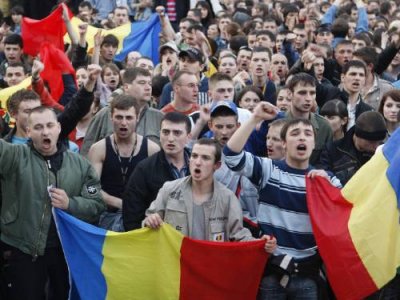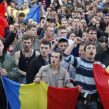
Moldovan Authorities Caught Unprepared by Violent Riots
Publication: Eurasia Daily Monitor Volume: 6 Issue: 73
By:

Moldova faces a prolonged political crisis following the April 7 violent devastation of the parliament and presidential buildings by a young mob, after the opposition’s loss of the April 5 parliamentary elections (EDM, April 7, 9). The election observation mission, representing the major European institutions, has assessed the elections positively overall, in no way questioning the outcome and accepting it as a genuine expression of voters’ choice. Nevertheless, the three opposition parties that have entered the new parliament are pushing for new elections in hopes of reversing the outcome. This is the second case ever (after Georgia last year and this) of self-characterized pro-Western politicians rejecting the Western observers’ assessment of the elections and taking to the streets.
Moldovan authorities have handled the situation unprofessionally, at times in panic, and often in ways damaging to their own case. Dozens of youths were severely injured in beatings -with two death cases reported- while in police custody after the riots. Police arrested at least 200 demonstrators irrespective of whether they had participated in the violence and arson or not; the identification process was slow and remains far from complete.
Police and law enforcement agencies revealed their lack of professionalism on four counts: an absence of advance intelligence about the protests (although the authorities now assume that the riots were pre-planned) and had no contingency plans to deal with such a situation. The authorities displayed a lack of modern training in crowd-control. Wrongly positioned during the assault on the parliament and presidency buildings, and ordered by Voronin to refrain at all cost from using force, the police allowed themselves to be stoned and beaten by rioters, then simply left the scene when the fires were raging. According to official data 272 injured policemen required medical assistance, including 56 who were hospitalized (42 were still in hospital as of April 13), 37 of whom required surgery (Moldpres, April 14). Some of the injured policemen’s comrades then vented their outrage by beating some of the arrested youths during the following days. Even post-factum, the law enforcement and internal intelligence agencies failed to provide Moldova’s political leadership with adequate information and analysis, leaving the leadership to speculate about hidden factors behind these events.
In several addresses to the country and officially reported government meetings, President Vladimit Voronin has characterized the riots as an anti-state putsch aiming to derail Moldova from its European orientation and undermine its statehood. Significantly, Voronin has stopped short of charging that the goal was to seize power; rather, he interprets the riots as designed to provoke disproportionate repression, thwart the opening of the new parliament, and divide Moldova and the EU (Moldovan TV, Moldpres, April 8 – 14).
Voronin and other Moldovan officials have greatly exaggerated the Romanian irredentism factor in the riots. Nevertheless, Romanian President Traian Basescu’s April 14 speech in the Romanian parliament unwittingly supplied some grist to Voronin’s mill in that regard. More tactlessly even than on previous occasions, Basescu characterized all Moldovans in blanket fashion as Romanians (although only few identify themselves as such); promised further state support by for boosting Romanian national sentiment in Moldova; and offered (despite long-standing EU objections) to initiate mass-distribution of Romanian passports for Moldova’s citizens (Rompres, April 14). Responding in a relatively more measured tone the next day, Voronin was able to claim that he now felt somewhat vindicated in his belief that Bucharest had helped orchestrate the riots (Moldpres, April 15).
The authorities maintain that the April 7 assault and arson had been planned in advance as an anti-state putsch (Moldpres, Moldovan Public TV, April 7 – 15). They have not adduced any evidence of it thus far; and their thesis seems implausible, given what looked like the spontaneous dynamics of the events on the ground. But the opposition leaders are involuntarily playing into the authorities’ hands with even more implausible accusations that agents of the authorities invaded and set fire to the presidency and parliament buildings.
Voronin’s orders to the police to yield to rioters if necessary for avoiding bloodshed, "lives are more precious than buildings," he said, is consistent with two major decisions he had taken earlier in his career. In November 1989, as internal affairs minister of Soviet Moldova, Voronin refused to shoot demonstrators who were attacking and setting fire to several floors of the Internal Affairs Ministry in Chisinau. On that occasion Voronin overruled the orders to shoot, relayed from the USSR Internal Affairs Ministry to the Moldovan Ministry. In March 2002 as president of Moldova, Voronin allowed the Christian-Democrat People’s Party (CDPP) full freedom to hold daily demonstrations for several consecutive weeks in central Chisinau against Communist-proposed legislation on language policy and related issues. Led by CDPP chairman Iurie Rosca, those protests were well organized and entirely peaceful; and Voronin took pride publicly in the fact that the police did not interfere with those demonstrations.




